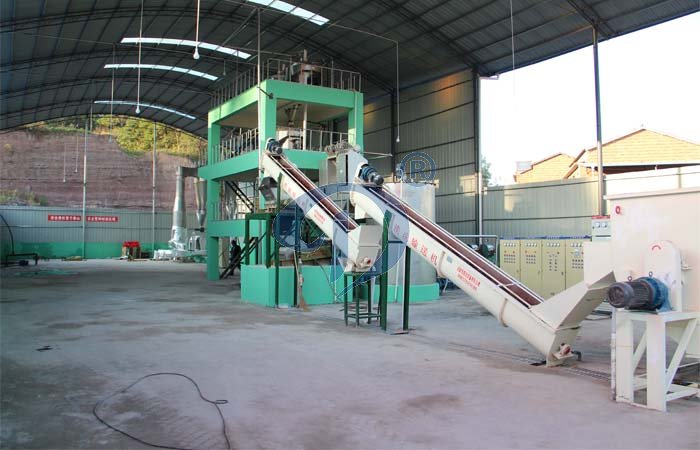The different between potato flour and potato starch
Industry news / Chat on line / Give me a price / Date:March 25, 2016

Potato starch processing plant
Knowing the difference between potato STARCH and potato FLOUR is essential when baking gluten-free.
For example, substituting potato flour for potato starch in a recipe will take you from light fluffy homemade treats to sad little gluten-free hockey pucks. Nobody wants to eat a hockey puck!
Of course, with all the alternative flours we use in our gluten-free baking, it can get confusing. I know many of you have asked about potato flour versus starch.
The way to remember the difference is that potato flour is made from whole potatoes, while potato starch is made only from the starch of the potato.
Potato Flour vs. Potato Starch
Potato Flour
Potato flour is made from whole potatoes (most of the time even the peel is included). The potatoes can be raw or cooked. Either way they are first dried then ground into flour.
The result is a heavy, cream colored flour with a distinct potato flavor. The flour readily absorbs liquid (similar to coconut flour in this regard), so it works best when incorporated into gluten-free flour blends in small amounts. Too much potato flour in a recipe will cause the finished product to be dense and gummy. For example, a muffin with too much potato flour would never fully cook through.
However, used in smaller quantities, the same properties of potato flour that lead to an overly dense and doughy finished product can actually mimic gums and help hold a recipe together. It also lends a hearty texture to baked goods. This, along with the potato flavor it imparts, can make potato flour a good choice in recipes for savory gluten-free breads or rolls.
Potato Starch
Potato starch is a very fine white powder starch, similar in texture to cornstarch. If you’re not very careful when working with and measuring potato starch, you can create quite a cloud in the kitchen!
It is made from the dried starch component of peeled potatoes. It has no potato flavor so works well in most recipes, sweet or savory.
As part of the starch component of a gluten free flour blend, potato starch lends a light, fluffy texture to baked goods.
It is also a great thickener in gravies, sauces, and even in custards and puddings, which typically use cornstarch.
This is great news for individuals with a corn allergy or those on a grain-free diet. Potato starch is also permitted for Passover (for this reason, some stores stock it in the Kosher section; if you are having trouble locating it in your supermarket, be sure to check there).
BUT, if you use potato starch as a thickener for a liquid (like gravy or a sauce), here’s a very useful tip: Unlike cornstarch, a liquid thickened with potato starch should never be boiled. The potato starch loses its ability to thicken once boiled.
Both potato starch and potato flour are available in most mainstream markets or specialty stores.
contact us
- Do you want to buy machine?
- Yes, I want to buy machine
- No, I want to learn more in advance.
- What is your raw material?
- Cassava
- Potato
- Sweet potato
- Other:
- What is the final product you want to produce?
- Chips
- Flour
- Starch
- What is the final product you want to produce?
- Garri
- Cassava flour
- Cassava starch
- Cassava chips
- Attiekie
- Bammy
- Other:
- What is your planned capacity for final product?
- <1 ton per day
- 1 ton per day
- 2 tons per day
- 3 tons per day
- 3-10 tons per da
- 10-20 tons per day
- >20 tons per day
- What is the usage of your cassava chips?
- Food usage (like fried chips, flour)
- Industrial usage (like animal feeds, ethanol)
- What is your planned capacity for final product?
- <5 ton per hour
- 5-10 tons per hour
- >10 tons per hour
- What is your planned capacity for final product?
- <500 kg per hour
- 0.5-5 ton per hour
- 5-10 ton per hour
- >10 ton per hour
- What is your planned capacity for final product?
- <300 kg per hour
- 300-1000 kg per hour
- 1-5 ton per hour
- 5-10 ton per hour
- >10 ton per hour

 Call us
Call us Chat online
Chat online
